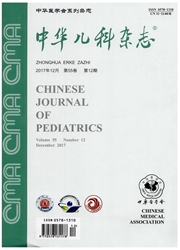

 中文摘要:
中文摘要:
目的 评价静脉注射丙种球蛋白(intravenous immune globulin,IVIG)1g/kg单次静脉注射治疗川崎病(Kawasaki disease,KD)的临床效果。方法 242例KD患儿随机分为IVIG1s/kg组与IVIG 2g/kg组,对两种治疗方法的疗效进行前瞻性对比研究。分别采用IVIG 1g/kg和2s/kg单次静脉注射,观察患儿总热程、退热时间、黏膜充血、手足肿胀和颈淋巴结肿大消退时间,监测外周血白细胞计数(white blood cells count,WBC)、血小板计数(platelet count,PLT)、血清丙种球蛋白(immunoglobulin,Ig)、C反应蛋白(Creacting protein,CRP)、血沉(erythrocyte sedimentation rate,ESR)、心电图(electrocardiogram,ECG)和冠状动脉病变(coronary artery lesion,CAL)恢复情况,并对治疗前后组内结果、治疗后组间结果进行比较。结果 IVIG 1g/kg组平均热程为10.6d,WBC、PLT、CRP、ESR及ECG异常率与治疗前比较显著降低(P〈0.001),IVIG1g/kg组与IVIG2g/kg组比较差异无统计学意义(P〉0.05)。WIG1g/kg组CAL发生率为29.5%(36/122),随访1年有87.5%的CAL恢复正常,12.5%未能恢复正常,其中9.4%为IVIG耐药病例;IVIG2g/kg组CAL发生率为24.2%(29/120例),随访1年有89.3%的CAL恢复正常,10.7%未能恢复正常,均为IVIG耐药病例,两组比较,差异亦无统计学意义(P〉0.05)。结论 IVIG1g/kg单次静脉注射治疗KD,可有效缓解临床症状,减低CAL发生率,减轻心血管系统损害,与IVIG2g/kg比较具有同样的近期和远期治疗效果。
 英文摘要:
英文摘要:
C Objective To evaluate the effectiveness of intravenous immunoglobulin IVIG, 1 g/kg single intravenous injection in treating and preventing cardiac consequences of Kawasaki disease (KD) in children. Methods A total of 242 children with KD disease were enrolled in the study. In the randomized controlled trial, they were randomly divided into two groups:IVIG 1 g/kg group and IVIG 2 g/kg group, with aspirin administered within the first 7 to 10 days of illness. The occurrence and restoration of coronary artery lesion (CAL) in these two groups as well as the clinical and laboratory indexes including total fever duration, restoration of cervical lymphadenopathy, white blood cells count, platelet count, serum immunoglobulin, C reactive protein, erythrocyte sedimentation rate and EKG were observed. The clinical effectiveness of the groups before and after the treatment was analyzed. Results The age of the 242 children with KD disease ranged from 3 months to 14 years ( mean 4. 0± 2. 8 years old). Male to female ratio was 1.66: 1, 83. 1% of KD patients were blow 5 years old, 93.4% patients were followed up with echocardiography at the end of the first year and the follow-up period was (38 ± 18) months, ranging from 4 months to 5. 4 years ; 86. 9% of the cases in 1 g/kg group and 91.7% of the cases in 2 g/kg group had their fever controlled within 48 hours. The difference was not significant ( P 〉 0. 05 ). Serum immunoglobulin level was markedly enhanced after IVIG. Serum immunoglobulin levels in the patients of 2 g/kg group and 1 g/kg group were (26.9 ± 7.4) g/L and ( 18.3±6. 9) g/L, respectively (P 〈 0.01 ). The average duration of fever in IVIG 1 g/kg group was 10. 6 days. After the treatment with 1 g/kg of IVIG, the abnormal white blood cells count, platelet count, C reactive protein, erythrocyte sedimentation rate and abnormal EKG findings were greatly improved ( P 〈 0. 001 ). However, there was no significant difference in the abovementioned improvement between IVIG
 同期刊论文项目
同期刊论文项目
 同项目期刊论文
同项目期刊论文
 期刊信息
期刊信息
